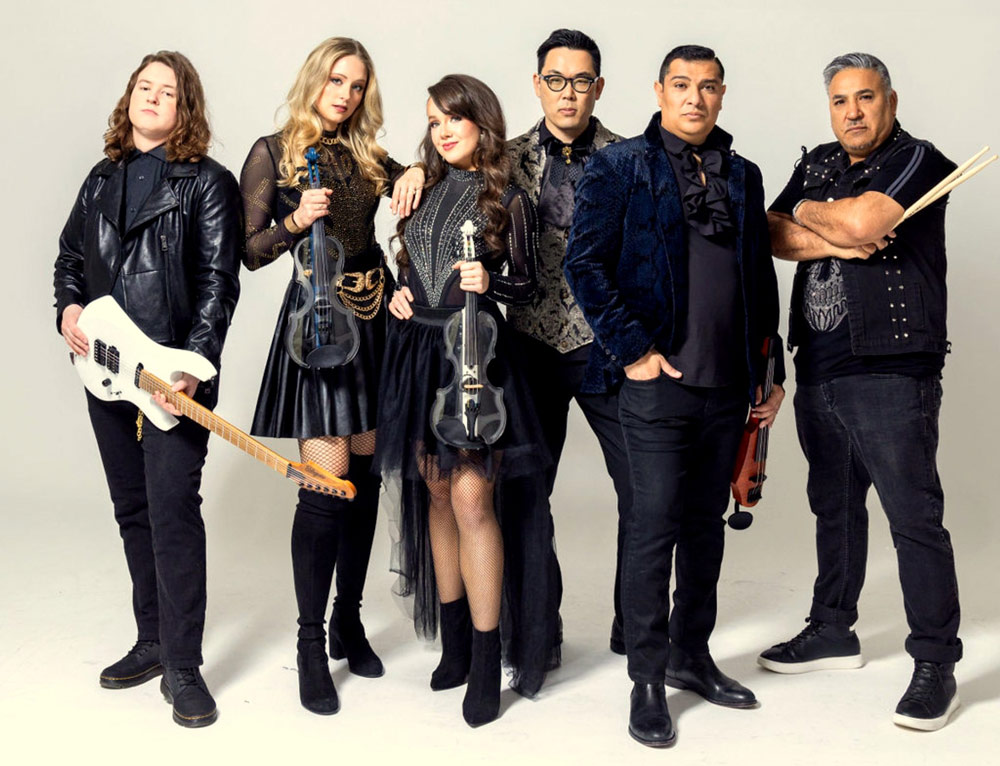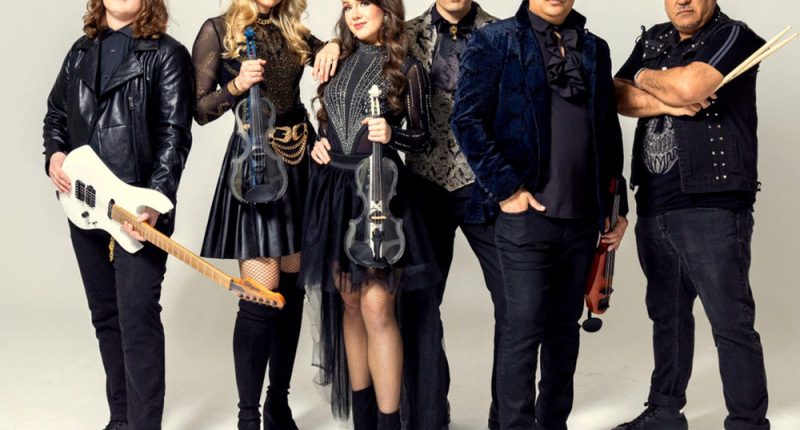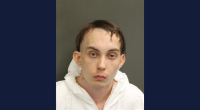
For two violinists in the Dallas String Quartet, the year 2010 was a bittersweet symphony.
That was when Romanian-born violist Ion Zanca, who had founded DSQ three years earlier, decided his ensemble should plug in their newly acquired, newfangled electric instruments, turn them up to a Spinal Tap-ish “11,” and rock out by performing “Bittersweet Symphony,” that 1997 hit by the British rock band the Verve.
“When we switched to electric (along with an infusion of rock and pop tunes into their repertoire), we had two violinists who absolutely declined to play electric,” Zanca said during a phone interview as he and two of his bandmates traveled by car to a DSQ concert in North Carolina. “They said it was not their thing and it was below them and all of that stuff.”
Zanca soldiered on with new players, and “Eclectric,” the DSQ’s cleverly titled 2010 debut album, featured string quartet arrangements of “Bittersweet Symphony,” the Beatles’ “Eleanor Rigby” and “All You Need Is Love,” the Eurythmics’ “Sweet Dreams,” the “new tango” of “La Muerte del Angel” by Argentine composer Astor Piazzolla, the enduring bolero “Bésame Mucho” by Mexican composer Consuelo Velázquez, and more.
Fifteen years on, the Dallas String Quartet has continued to invigorate the so-called “classical crossover” genre with seven albums that find them infusing elements from Bach, Rachmaninoff, Sibelius and other classical composers into their arrangements of Led Zeppelin’s “Kashmir,” Taylor Swift’s “Anti-Hero,” Guns N’ Roses’ “Sweet Child O’ Mine,” AC/DC’s “Back in Black” and “Thunderstruck,” Michael Jackson’s “Thriller,” Leonard Cohen’s “Hallelujah,” Journey’s “Don’t Stop Believin’ ” and many more pop and rock classics.
Augmented by a guitarist and drummer, DSQ will perform its “Strings Unleashed” show at 7 p.m. Friday, April 11 at the Fitzgerald Performing Arts Center in Palm Coast.
Yes, classical crossover has its critics (even the Three Tenors – Luciano Pavarotti, Plácido Domingo and José Carreras – were lambasted during their 1990s heyday for supposedly sullying opera with Broadway and pop tunes). But Zanca noted at least one convert to his quartet’s Bach ’n’ roll: one of those DSQ violinists who had bailed at the first mention of going electric.
“It was interesting,” Zanca said. “A few years later we were doing a concert, opening for Chicago or one of those bands, and the same person came and said, ‘I didn’t know this could be that much fun – can I come back and play some of this stuff?’ I said, ‘Obviously it would not be fair to kick somebody out now.’ ”
Meanwhile, DSQ has performed for Presidents Obama and George W. Bush, with English singer-songwriter Ed Sheeran and country singer Luke Combs, and at the Academy of Country Music Awards. The quartet also performed at the 2021 wedding of pop star Gwen Stefani and country star Blake Shelton.
DSQ’s latest album, the 2022 release “Love Always,” placed at No. 2 on Billboard’s Classical Crossover chart and Classical Albums chart.
Along with Zanca, the core group includes violinists Valory Hight and Melissa Priller, and bassist Young Heo. The Strings Unleashed show also features guitarist Joel White and drummer-percussionist Efren Guzman Jr.
Born in Romania in 1980, Zanca (who, when asked to confirm some biographical details, joked that he is “6-2 with blonde hair”) grew up in a musical family.
“My dad was a musician, my brother, my grandparents,” Zanca said, his accent enlivened by his Romani heritage. “I didn’t stay at home a whole lot because I was in boarding school since I was very young. At the time I do remember being home, I just remember all the musicians coming over to my house. My dad was a band leader. I remember them always having their coffee and getting ready for the events and the performances they had. I think in some weird subconscious way I recreated that here (in the U.S.) – I’m always around musicians drinking coffee.”
Zanca believes his path to a life in music was pre-ordained: “I didn’t have much choice, to be honest. I think my parents made up their mind that that’s what I was going to do.”
He began studying piano at age 5 and viola at age 9. He attended the National Conservatory of Music in Bucharest from 1999-2001. When a friend from the same studio where he was studying moved to the U.S. to study at Louisiana State University, she inspired Zanca to do the same.
“I’ve always been fascinated with America, and it was the right time for me to come,” he said.
After two years at LSU, Zanca transferred to Southern Methodist University in Dallas, where he earned his bachelor’s and master’s degrees in Music Performance. He founded DSQ in 2007 as a traditional string quartet, with musicians he had met at SMU.
The change to the rock and pop of classical crossover was not the result of some grand design.
“We were playing acoustic at a private event that was fairly important and nobody could hear us,” Zanca said. “I didn’t want to be furniture and just be there. So I started looking at other possibilities, and miking an acoustic violin was too complicated for my knowledge at that point.”
He discovered that Yamaha, the musical instrument and audio company, was creating electric violins, and he procured some for his quartet.
In time Zanca realized that “certain music pieces fit better on electric violin than on classical instruments,” he said. “If it’s a pop or rock tune, the electric violin allows you to put on an effect or distortion so that it’s almost treated like a guitar. So, you have a little bit more tools for a show. And then we decided to add percussion and other instruments to the quartet to cut through and perform some of the more modern music.
“We didn’t quit performing on the acoustic classical instruments. We just found that there was an additional tool that we could use. I never looked at it as abandoning the classics.”
Even as Zanca and his mates were pumping up classical crossover with their versions of Queen’s “Bohemian Rhapsody” and Katy Perry’s “Firework,” Zanca found himself unexpectedly confronting the horrific history of his Romani ancestors – during a visit some eight years ago to the Dachau Concentration Camp Memorial Site.
That visit, as recounted on dallasstringquartet.com, was the moment Zanca “discovered a cruel chapter of his own heritage. Amidst the barbed wire and walls of the museum, he stumbled upon a section dedicated to the Romani people, his ancestors, whose stories had long been shrouded in silence. Although raised in Romania, this was the moment Zanca learned of Adolf Hitler’s Nazi Policy during World War II declaring all Romani ‘lives unworthy of living’ . . . . An estimated 80% of the Romani population, about 1.5 million, were killed with the intent of genocide by the Germans from 1933-1945. Commonly referred to by the derogatory name ‘Gypsies,’ their story remains relatively unknown, as societal bias continues to marginalize Romani as ‘lower class.’ ”
“In the Romani culture people don’t talk about this,” Zanca told FlaglerLive. “It’s like a really dark chapter and nobody really wants to talk about it, and you just hear stories that you don’t know if they’re true or not. But when I saw it being acknowledged (at Dachau) – they had a map that showed where they were picking up people, and then it became super real. For the longest time I blocked it, to be honest – I didn’t know what to do with this information.”
Ultimately Zanca was inspired to compose “Romani: The Untold Story,” a five-song work recorded with the London Symphony Orchestra at Abbey Road Studios in London, the very recording space made famous by the Beatles. The work was released in 2024.
“We play all this fun music and it’s really cool, but sometimes you want an album that is you, that represents your story, your way of thinking,” Zanca said.
His father, Mircea Zanca, passed away during the earliest stages of the project, and so the album became “kind of a tribute to him,” Zanca said. That’s especially true of the album’s last “chapter,” the frenetic, ebullient “Rhapsody for the Romani” that the DSQ website describes as “celebrating life’s joy in the face of adversity.”
“My dad was a musician for 65 years,” Zanca said. “He played everything in the most humble places and in the nicest places in Romania, and I just wanted to honor him. The last piece is a rhapsody which is a collection of dances of the Romani people from around the world, including some that my dad used to play. That was very meaningful and beautiful to me.”
DSQ’s Palm Coast concert will not feature segments from “Romani: The Untold Story,” but the program will still be “so eclectic,” Zanca said. “We used to call it ‘From Bach to Bon Jovi.’ In the end when you look at music, there are great melodies no matter when they were written, whether it was 1600 or in 2015. Our goal was to make a collection of that and bring some of the most beautiful pieces to the concert.”
– Rick de Yampert for FlaglerLive
The Dallas String Quartet will perform at 7 p.m. Friday, April 11, at the Fitzgerald Performing Arts Center, 5500 East Hwy. 100, Palm Coast (on the campus of Flagler Palm Coast High School). Tickets are $54-$64, available online at flaglerauditorium.org, or at the box office from 10 a.m.-4 p.m. Monday-Friday and also from 5:30 p.m. to curtain time on show day. Information: 386-437-7547.










